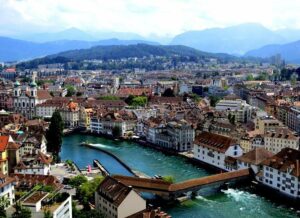
In this article, we’ll explore the avenues leading to Swiss citizenship and all the rights and privileges that come with it. From naturalization to descent and marriage to investment, the paths to becoming a Swiss citizen are as varied as the country’s landscape.
We will also examine the benefits that come with holding a Swiss passport, a symbol of global mobility and a gateway to Europe.
Swiss Citizenship
The Swiss government has set out three primary ways in which you can obtain citizenship. As with most European countries, you can get Swiss citizenship automatically by being born to Swiss citizens, living in Switzerland for a specific amount of time, or marrying someone who is already a legal Swiss national.
Swiss Citizenship by Descent
Switzerland recognizes the rule of jus sanguinis, meaning that citizenship is determined or acquired by the nationality of your mother or father’s nationality. This is different from jus soli, which determines your citizenship based on where you are born. Switzerland doesn’t follow this rule, so even if you are born in Switzerland, you don’t automatically become Swiss.
According to the Swiss government, the following persons are considered Swiss citizens from birth:
- a child whose parents are married to each other and whose father or mother is a Swiss citizen
- a child of a female Swiss citizen who is not married to the child’s father
- A minor foreign child of a Swiss father who is not married to the child’s mother acquires Swiss citizenship as if at birth by establishing the father’s paternity
- If a minor child who acquires Swiss citizenship under paragraph 2 has children, the children also acquire Swiss citizenship.
As a child of a Swiss citizen, you need to prove:
- were under the age of 18 at the time that your parent(s) applied for naturalization
- apply for naturalization before the age of 22
- can prove that you have been living for five years in Switzerland, including the three years immediately before your application is made.
However, there is a time limit when a child is born outside of Switzerland and has dual citizenship with at least one parent being Swiss. The child will automatically lose their Swiss citizenship at the age of 25 unless they retain their Swiss citizenship by notifying a Swiss authority abroad or in Switzerland of their birth before their 25th birthday or declaring in writing that they wish to keep their Swiss citizenship.
Swiss Citizenship by Naturalization
The most common way to obtain Swiss citizenship is through naturalization. This process is quite lengthy and complex, and requires meeting certain criteria, such as having a clean criminal record, living in Switzerland for at least 10 years, and demonstrating proficiency in at least one of the Swiss national languages.
Ordinary naturalization: If you have permanent residence, you can apply for Swiss citizenship if you have lived in the country for at least 10 years, with three of those years being in the last five years before application.
Eligibility Criteria and Requirements

- How long you have been holding a B or C permit
- The length of time you have held a legitimation card
- And if you are holding an F permit, only half of this period is counted.
In addition to federal laws, there could also be specific canton laws. For example, cantonal legislation requires a minimum residence period of between two and five years in the commune and in the canton concerned.
When you launch your application, a competent authority in the canton ensures that you meet the formal requirements, are successfully integrated and are familiar with the Swiss way of life.
They then draw up a naturalization report on these points, which may also stipulate additional integration requirements. When satisfied, the canton sends the application and the naturalization report to the State Secretariat for Migration SEM for approval and the issuing of a federal naturalization license.
Timeline and Cost
Once a federal naturalization license is issued, the canton has to reach a formal naturalization decision within one year. On expiry of this period, the federal naturalization license ceases to be valid. However, if it is approved, you have legally acquired not only communal and cantonal citizenship but Swiss federal citizenship as well.
- for persons over the age of 18 at the time the application is made, the cost is $116.
- for spouses who apply jointly, the cost is $174.
- for persons who are under the age of 18 at the time the application is made, the cost is $58.
Swiss Citizenship by Marriage
The second way that you can become a Swiss national is when you are married to a Swiss citizen. Under federal law, this is called Simplified naturalization.
Simplified naturalization: Foreigners would go through this process if they are married to a Swiss citizen or fall under the third generation of a family of foreign citizens living in Switzerland.
Eligibility Criteria and Requirements
The Swiss Citizenship Act stipulates that you can apply for simplified naturalization under the following conditions:
- You are the husband or wife of a Swiss citizen. They must have lived for a total of five years in Switzerland, have spent the year prior to submitting the application in Switzerland and must have been married to and living with the Swiss citizen for three years
- You are the husband or wife of a Swiss citizen living abroad. They must have been married to the Swiss citizen for six years and have close ties with Switzerland.
However, there are conditions that would exclude you from gaining Swiss citizenship through marriage. For example, both spouses were foreign citizens when they got married and the wife or husband acquired Swiss citizenship through ordinary naturalization after getting married. Another instance that makes it impossible is if the Swiss spouse dies before the application is submitted.
Language requirement: At the time of your application, you must be able to communicate in everyday situations in one Swiss national language, both orally and in writing. This can be in German, French Italian or Romansh. You need to have written language skills of at least A2 level and spoken language skills of at least B1 level.
Switzerland Golden Visa: The Application Process
The Swiss Golden Visa program is aimed at attracting non-EU high-net-worth individuals and foreign investors by granting them residency rights in the nation in exchange for a financial contribution to its economy. Individuals can qualify for Swiss citizenship after residing in the nation for a period of no less than 10 years – previously 12 years.
While Switzerland’s citizenship by investment program is more of a residency scheme that leads to a passport by investment, the premise is the same. You must make a minimum investment to the Swiss economy and are only then rewarded with living in Switzerland and eventual Swiss citizenship.
Investment Options

Swiss residency through a Lump Sum Taxation: The Swiss Lump Sum Taxation provides a relatively quick pathway to residency. If you’re a wealthy individual or retiree, then this option is well suited. For a minimum annual tax fee of $290,000 or more, you can live in Switzerland with your family, and there’s no need to declare worldwide income and assets to the tax authorities.
The most popular Swiss cantons for this program are Appenzler, Bern, Geneva, Fribourg, Graubunden, Jura, Nidwalden, Schwyz, St.Gallen, Vaud, Valais, Lucerne, Slothurn, Obwalden, Thurgau, Ticino, and Zug.
Swiss Business Investor Program: You must make a minimum investment of $1.16 million in a pre-approved business to obtain a residence permit. Note that when setting up a new business or subsidiary in Switzerland, you can choose a branch office or a separate legal entity in the form of a limited liability company or a stock corporation.
While it’s a relatively straightforward process, you have to prove that your investment benefits the Swiss community by either keeping existing jobs or creating full-time jobs for Swiss citizens. Your respective investment must be made in the canton where you will live and be maintained during your residency.
Eligibility Criteria
- Be a non-EU citizen
- Be aged between 18 to 55
- Clean criminal record
- Good health
- Official source of income
- Proof of finances
- Show proof of owned or rented accommodation in the country
Time to Residency and Citizenship
The entire process takes about 10 years to complete, with several steps along the way. While each might be different, generally, it follows the same timeline.
Choose your investment option: Select your investment route to a Swiss passport.
Acquire approval from Swiss authorities: To invest in the Swiss economy, signing treaties with the Swiss authorities is mandatory. You must also collect all the necessary documents to pass a stringent due diligence check. This takes about a month.
Apply for the D Visa category: Following the Swiss government’s approval, you can apply for a D visa category. Submit the required documents, issue bank statements, obtain a health insurance policy and prepare confirmation of your excellent personal and business reputation in line with Swiss law. This takes about a month.
Obtain Swiss residence permit: With a D visa, relocate to Switzerland with your family members and obtain a residence permit in Switzerland. To do this, prepare your paperwork for Swiss Canton authorities and register with the local state bodies. This takes about two months, and once you have your permanent residence permit, you can take it to the next step.
Apply for Swiss citizenship: Renew your Swiss residence permit until after a ten-year stay in Switzerland, you can obtain Swiss citizenship. To obtain a Swiss passport, you must prove proficiency in one of the official languages and demonstrate that you’ve successfully integrated into Swiss society.
Benefits of Swiss Citizenship
Blessed with incredible landscapes, abundant greenery, and a peaceful way of living, Switzerland offers a highly attractive lifestyle and stable environment for non-EU foreign nationals looking to call this beautiful nation home.
Swiss banking and insurance
Swiss banking and insurance banking are the lifeblood of Switzerland’s financial system, which is one of the best in the world. Since the Swiss financial industry is so regulated, Swiss banks and insurance companies are secure. For foreign investors seeking privacy, investing in Switzerland is a fantastic idea.
Top-notch infrastructure
While Switzerland has high living costs, wages are high, and the cost of doing business is worth it. Reliable public services, transport, research and development facilities, communications, energy, and low waste disposal systems directly feed into Switzerland’s high living standards.
Thriving business environment
Switzerland is a fantastic hub for big and small companies, reputable international finance companies, as well as enterprises and private entrepreneurs. As a business-friendly nation, its Swiss cantons offer individuals a range of opportunities, with company registration being a relatively easy process.
Visa-free travel
A Swiss passport is the sixth best in the world for global mobility. You can visa-free travel to 172 destinations, including the European Union, USA, Canada, Australia and Japan.
Obtain Swiss real estate
Buying Swiss real estate is usually a headache in Switzerland. However, with a Swiss residence permit, you can acquire real estate property of your choosing in Switzerland. While the approvals for real estate are generally difficult to obtain, it’s relatively easy to buy real estate when you have a Swiss residence permit in your hands.
Family included in the application
The Swiss golden visa application can include your direct family members, including your spouse and dependent children (under 18).
Dual Citizenship in Switzerland
Switzerland allows for dual nationality. However, it depends on whether the second nation allows it. According to the Swiss Federal government, “Swiss citizens may acquire another nationality without affecting their Swiss citizenship provided that the legislation of the other state does not require that they renounce their citizenship of origin.”
This means that you could lose the citizenship of your original country when obtaining Swiss citizenship.
How to Get a Swiss Passport
All Swiss citizens are entitled to have a passport and a Swiss identity card. As with many EU countries, the Swiss passport features biometric technology that contains your fingerprints and an image of your face.
An application for a Swiss passport is made online, and once reviewed, you’ll be invited to capture your biometric details. You also have the opportunity to apply for an identity card at the same time.
By Swiss law, it shouldn’t take more than 30 days to receive your passport if you live outside of the country, and should take only 10 days if your postal address is within Switzerland.
Passport Cost
There are different costs for passports and identity cards, depending on the type and the age of the applicant.
Adults: A passport costs $162, an identity card is $75, or if you apply for both at the same time, it costs $171. The passport and identity card is valid for 10 years.
Children and minors: A passport costs $69, an identity card is $34, and if you apply for both at the same time, it will cost $78. The passport and identity card is valid for five years.
All identity card and passport applications will incur a delivery between $5 and $10.
Frequently Asked Questions about Swiss Citizenship
How can I obtain Swiss citizenship?
Most commonly, naturalization occurs through an extensive process requiring a number of criteria, including having a clean criminal record and demonstrating proficiency with at least one of the national languages of Switzerland.
Is Swiss citizenship based on ancestry?
Swiss citizenship is automatically granted to people born into paternity. You can get Swiss citizenship by having a Swiss father or any Swiss parent. The process is a bit more complex for an unmarried Swiss father.
Can you get Swiss citizenship on a permanent residence permit?
Yes, you can. Obtaining Swiss citizenship is a long process, and you can only become a Swiss citizen when you have lived in the country for 10 years. Having a permanent residence permit is a crucial step if you want to become a Swiss citizen.




